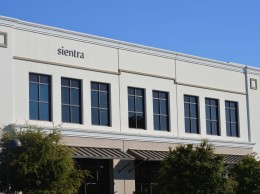Sientra to go public, raise up to $86.2M
IN THIS ARTICLE
- South Coast Topic
- Stephen Nellis Author
By Stephen Nellis Friday, September 19th, 2014
Santa Barbara-based breast implant maker Sientra filed papers Sept. 19 to raise up to $86.2 million in an initial public stock offering.
Sientra has raised $151 million in venture capital to date and rose to prominence in 2012 when it became only the third company in the nation to receive U.S. Food and Drug Administration approval to sell silicone breast implants. Sientra was also the first company to introduce teardrop shaped implants to the U.S. market, with competitors Mentor Worldwide and Allergan following suit.
If successful, Sientra would list under the symbol SIEN on the New York Stock Exchange. Sientra also would be the second medical device company in the region to go public this year after Goleta-based oxygen system maker Inogen raised $70.5 million.
A publicly traded Sientra could also help revitalize the implant industry in the region, which has historically hosted the biggest players in the sector and even supplied much of the raw materials used in the devices. This summer, Allergan said it would cut 300 jobs and shutter its Goleta facility as part of a consolidation plan driven by a hostile takeover attempt.
A Sientra IPO would return a local publicly traded breast implant headquarters to the region for the first time since 2009, when Johnson & Johnson bought out Mentor Corp. in a $1 billion deal. Sientra was founded in 2007 by Hani Zeini, a veteran of Inamed, the implant company that sold to Allergan for $3.2 billion in 2005.
Zeini assembled a team that bought the North American subsidiary of a Brazilian implant company called SiliMed and shepherded the products through the U.S. approval process. Between founding Sientra and bringing its products to market, Sientra endured both a downturn in the U.S. economy and a regime change at the FDA.
“We realized that at the FDA, there’s a new team. We realized our job was not to fight them, as was the temptation, but to embrace them and manage them,” Zeini said at Santa Barbara speaking engagement in 2013.
Not long after Sientra received its approvals and began selling its implants, Mentor sued the company, alleging that Sientra had unfairly competed against Mentor by hiring away key sales people. Sientra won the lawsuit last year, and Mentor did not appeal.
“After a year of discovery and draining us, and six and a half weeks in court, they did not show one iota of evidence to support any of the allegations in the complaint. We put on our side of the case in six days,” Zeini told the Business Times last year in an interview.
Sientra has expanded sales quickly. Between 2012 and 2013, its revenues grew 237 percent, from $10.4 million to $35.1 million. Revenue for the first half of 2014 is $21.9 million, up 22 percent from $17.9 million the same period a year earlier.
Sientra is considered an “emerging growth company,” which means it doesn’t have to disclose compensation for all executives, only has to present two years of financial data and faces looser rules around verifying its accounting.
The deal’s underwriters are Piper Jaffray & Co., Stifel, Nicolaus & Co., Leernik Partners and William Blair & Co. Santa Barbara attorney Tom Hopkins of the law firm Cooley is handling legal work on the offering.








